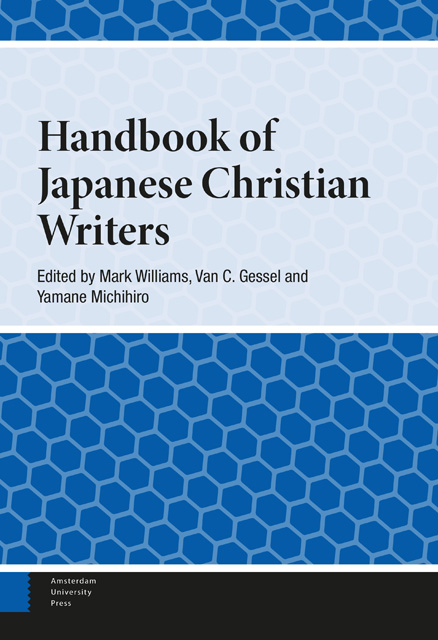Book contents
- Frontmatter
- Contents
- Contributors
- Abbreviations
- Preface
- Introduction
- 1 Prophet of the Inner Life: Kitamura Tōkoku
- 2 Shimazaki Tōson and Christianity: When the Cherries Ripen in the Taishō Period
- 3 Arishima Takeo and Christianity
- 4 Akutagawa Ryūnosuke: A Christian Life
- 5 Incarnation of the Christian Faith in the Poetry of Yagi Jūkichi
- 6 Hori Tatsuo: The Cross Dyed in Bloody Red and the Little Gods of Ancient Times
- 7 Nagai Takashi on Divine Providence and Christian Self-Surrender: Towards a New Understanding of hansai
- 8 Dazai Osamu: His Wrestle with the Bible
- 9 Shiina Rinzō: His Two Visages
- 10 From out of the Depths: Shimao Toshio’s Literary Response to Adversity
- 11 Yasuoka Shōtarō and Christianity: From Postwar “Emptiness” to Religious Longing
- 12 Miura Ayako and the Human Face of Faith
- 13 Endō Shūsaku and the Compassionate Companionship of Christ
- 14 Ogawa Kunio: Renewal of Faith and Identity in His seishomono (Bible Stories)
- 15 Kaga Otohiko: In Search of What Lies Beyond Death
- 16 Sono Ayako: Amor Vincit Omnia
- 17 Takahashi Takako: Drawing Closer to God Through Literature
- Index
- Index of titles
8 - Dazai Osamu: His Wrestle with the Bible
Published online by Cambridge University Press: 09 June 2023
- Frontmatter
- Contents
- Contributors
- Abbreviations
- Preface
- Introduction
- 1 Prophet of the Inner Life: Kitamura Tōkoku
- 2 Shimazaki Tōson and Christianity: When the Cherries Ripen in the Taishō Period
- 3 Arishima Takeo and Christianity
- 4 Akutagawa Ryūnosuke: A Christian Life
- 5 Incarnation of the Christian Faith in the Poetry of Yagi Jūkichi
- 6 Hori Tatsuo: The Cross Dyed in Bloody Red and the Little Gods of Ancient Times
- 7 Nagai Takashi on Divine Providence and Christian Self-Surrender: Towards a New Understanding of hansai
- 8 Dazai Osamu: His Wrestle with the Bible
- 9 Shiina Rinzō: His Two Visages
- 10 From out of the Depths: Shimao Toshio’s Literary Response to Adversity
- 11 Yasuoka Shōtarō and Christianity: From Postwar “Emptiness” to Religious Longing
- 12 Miura Ayako and the Human Face of Faith
- 13 Endō Shūsaku and the Compassionate Companionship of Christ
- 14 Ogawa Kunio: Renewal of Faith and Identity in His seishomono (Bible Stories)
- 15 Kaga Otohiko: In Search of What Lies Beyond Death
- 16 Sono Ayako: Amor Vincit Omnia
- 17 Takahashi Takako: Drawing Closer to God Through Literature
- Index
- Index of titles
Summary
The connection between Dazai Osamu and Christianity is rooted in the Bible. From around 1935, when Dazai began to read the Bible in earnest, his literature includes frequent citations from the Bible and a strong Christian worldview comes to pervade his oeuvre. This trait is particularly noticeable in his postwar works penned between 1945 and 1948, as a result of which a distinction can be drawn between his “period of evacuation in Tsugaru” and his “final works.”
Introduction
Dazai Osamu (1909–1948) was neither a Christian, nor is there any evidence that he ever attended Christian services. Even so, the reason his relationship with Christianity is discussed within the framework of Christian writers stems from the biblical quotations found in many of his works, as well as from the influences he received from his Christian associates. In considering Dazai's relationship with Christianity, the following words have the most symbolic significance: “I do not go to church, but I read the Bible” (DOZ 11: 259).
The context for this statement may be traced to the so-called “Non-church” movement in Japanese Christianity as typified by the teachings of Uchimura Kanzō. We can see this in the profound influence of the Non-church magazine, Seisho chishiki (Bible Knowledge), to which Dazai subscribed, and to his powerful obsession with reading the Bible. Also, Dazai had the following to say about the relationship between the Bible and Japanese literature:
With the single volume known as the Bible, the history of Japanese literature can be clearly divided in two with a heretofore unknown clarity. It took me three years to finish reading Matthew Chapter 28. Mark, Luke, John; Ah! When will I be able to obtain the wings described in the Gospel of St. John? (DOZ 3: 71)
There are doubtless differing opinions on how to demarcate the history of Japanese literature; but Dazai acknowledges the great influence that the Bible has had on Japanese literature. Furthermore, in his statement that it took him three years to finish reading the Gospel of St. Matthew, we can see the influence of Seisho chishiki and the energetic stance that Dazai took in his thorough reading of the Bible.
- Type
- Chapter
- Information
- Handbook of Japanese Christian Writers , pp. 137 - 153Publisher: Amsterdam University PressPrint publication year: 2022



